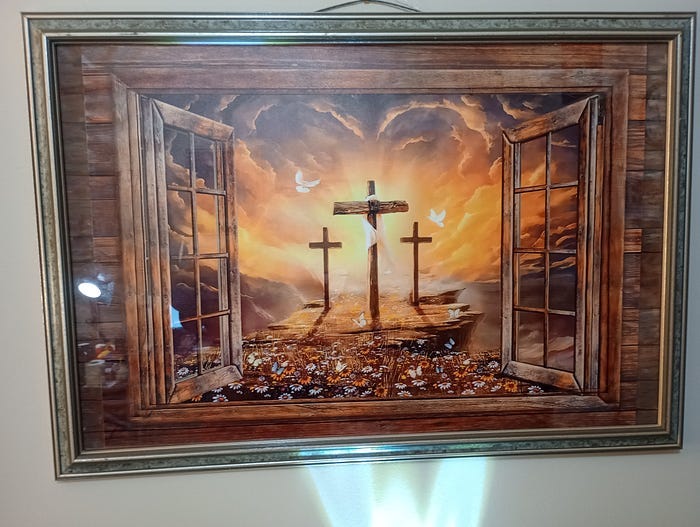
Why the Cross?
Crucifixion, or executing the vilest of criminals by hanging them on a wooden cross, was probably first done in Babylon or Persia about four hundred years before the birth of Jesus. It would continue for another 400 years after His death before the Roman Empire would abolish it. Ironically, it was the Romans who would “perfect” this evil punishment to the hideous torture that it was, allowing a man to suffer upwards of four days before succumbing to death.
Ironically, death by hanging a man on a tree or other wooden structure was nothing new to the Jews anyway. As far back as the writings of Moses, they had been instructed to use this as a manner of capital punishment for the most heinous of crimes.
“And if a man have committed a sin worthy of death, and he be to be put to death, and thou hang him on a tree: His body shall not remain all night upon the tree, but thou shalt in any wise bury him that day; (for he that is hanged is accursed of God;) that thy land be not defiled, which the LORD thy God giveth thee for an inheritance.” (Deuteronomy 21:22,23 KJV)
While this is not an article about the justification of Jesus’s trial or sentencing, let us point out that the charges of trying to insight rebellion and His claims to be the “King of the Jews” would have been reason enough for the Romans to execute Him. However, Pilate did not find Him guilty of this. Again, this is a discussion for another time.
How should the cross be remembered?
Throughout modern history, the cross has been a symbol of Christianity. It has adorned altars, pulpits, walls, and windows and hung around the necks of the faithful. Laity and clergy alike wear the cross to announce to the world that they are Christians. In fact, I wear one around my neck with a reservoir of water from the Jordan River and some soil from the Holy Land. While I cherish it as a gift from my wife and a symbol of my faith, it is in no way an item of protection from harm, a holy relic, or something to venerate or pray to. In my office hangs a cross with a symbolic purple cloth wrapped around it, representing the one placed on Jesus in Mark 15:17.
“And they clothed him with purple, and platted a crown of thorns, and put it about his head,” (Mark 15:17 KJV)
When we read the Ten Commandments in Exodus 20, there is no doubt that worshipping any other god and making idols is forbidden in no uncertain terms. God doesn’t mix words here at all. In fact, there is a bit of irony in that while Moses was meeting with God and receiving the Law, the very people He was giving the Law to were down below doing exactly that!
Some people have said that presenting a cross, even in a church building, a painting, in jewelry, or on the front of a pulpit, is tantamount to elevating it to the status of a deity. In my research for a book on the Ten Commandments, I have come across at least one author who would have us not have images of Jesus or crosses present anywhere in worship as it causes us to replace the true God of our worship with an idol.
This practice is common in some churches, to the point of kissing or offering gifts to representations of Jesus, Mary, saints, and the cross, believing that these images are a mere portrayal of the person. Thus, this is not idolatry in the eyes of the faithful. Or is it?
Recognize the cross for what it truly is.
I have heard some people say that we should not even wear or display the cross because it was a “murder weapon.” Truth be told, Jesus was not murdered. He went willingly to the cross with a purpose. If we recognize this and display the cross in whatever fashion, I believe it can still have a place in Christian worship today. In fact, without it, what are we worshiping? What are we celebrating if not the cross and what happened that most eventful Friday?
We cannot have Christianity without the cross. Without it, Jesus would not have died. Our sins would not have been paid for. However, as we remember the cross, let us remember first and foremost that it was the Son of God and His voluntary sacrifice on it that made this manmade instrument not a tool of death but a mechanism by which our sins died.
If you have accepted the death, burial, and resurrection of Jesus Christ as the way of salvation in your life, then praise be to God. However, if you are uncertain whether you are going to Heaven or know you lack this, do not hesitate. Let this be the moment that you give your life to Him. Acknowledge that His sacrifice on the cross was enough. Confess your need for a savior. Then, share this experience with me in the comments or contact me directly.
Living Faith by James M. Dakis is a Christian writing ministry that shares devotional teachings and faith-based fiction for anyone hoping to grow in Christ. Whether you are already a Christian or have questions about your faith, I would love to talk with you. Comment here or reach out to me personally.





